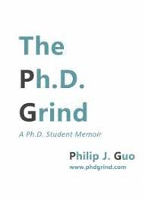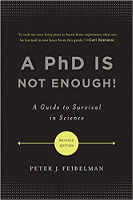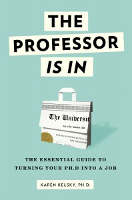 The PhD Grind (2012) by Philip Guo is a must read if you want to do a PhD in Computer Science. Even if you're already doing one, I definitively recommend it. It's a first-person account of how it was for the author to complete a six-year PhD at Stanford. Basically all of the obstacles that the author had to overcome during his PhD, are things that either happen to all of us, or that I've heard many times from PhD students. Read this. It's a very short free book that articulates well some of the common negative experiences of PhD students -- and what you can learn from those experiences.
The PhD Grind (2012) by Philip Guo is a must read if you want to do a PhD in Computer Science. Even if you're already doing one, I definitively recommend it. It's a first-person account of how it was for the author to complete a six-year PhD at Stanford. Basically all of the obstacles that the author had to overcome during his PhD, are things that either happen to all of us, or that I've heard many times from PhD students. Read this. It's a very short free book that articulates well some of the common negative experiences of PhD students -- and what you can learn from those experiences.
 If you are already doing your PhD, specially if you're in your last years, read A PhD Is Not Enough (2nd ed, 2011) by Peter J. Feibelman. Again, it's a short book, that focuses on the transition from PhD student to tenure-track professor to tenure. It has tons of great concrete advise and tips.
If you are already doing your PhD, specially if you're in your last years, read A PhD Is Not Enough (2nd ed, 2011) by Peter J. Feibelman. Again, it's a short book, that focuses on the transition from PhD student to tenure-track professor to tenure. It has tons of great concrete advise and tips.
 Finally, a very comprehensive book is The Professor Is In (2015) by Karen Kelsky, which is really a career guide for academics. The author, a former tenured professor and department head, maintains a popular blog on the subject, and professional career counseling/coaching services. Her approach, as she admits openly, has neoliberal tones: this is a competition that you want to win, however, the author also gives a very reasonable justification as to why this is a good mindset to approach some key career steps. The book is a really detailed guide that covers basically every aspect of an academic career, starting with choosing a PhD advisor but going well into valuable tips for those holding a more advanced or tenured, position.
Finally, a very comprehensive book is The Professor Is In (2015) by Karen Kelsky, which is really a career guide for academics. The author, a former tenured professor and department head, maintains a popular blog on the subject, and professional career counseling/coaching services. Her approach, as she admits openly, has neoliberal tones: this is a competition that you want to win, however, the author also gives a very reasonable justification as to why this is a good mindset to approach some key career steps. The book is a really detailed guide that covers basically every aspect of an academic career, starting with choosing a PhD advisor but going well into valuable tips for those holding a more advanced or tenured, position.
My advise: read all three, starting with the first one which is shorter.
Bonus: slides by José L. Balcázar on doing research, publishing, writing, defending, and applying for grants.